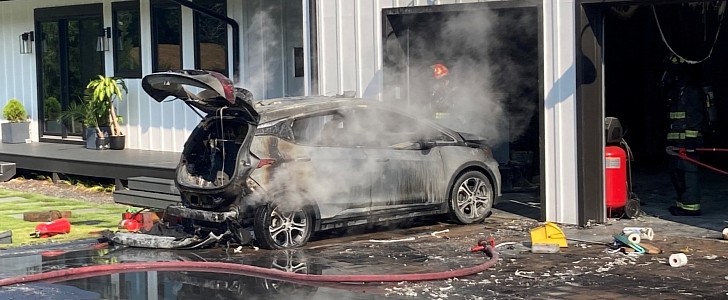Either LGES is a fast learner, or General Motors is a good teacher. Only a week ago, GM said that its engineers had the mission to “clean up the manufacturing process” LGES adopted for batteries. It would be done by implementing “GM quality metrics.” The automaker now disclosed that the Korean supplier is making batteries for the Bolt EV and Bolt EUV again. GM expects them to reach dealerships by mid-October. That means replacing the defective battery modules will begin by that time.
Although that is good news, owners will still have to wait for quite a while to use their cars as they should. Until their vehicles go through the replacing process, they will have to charge up to 90%, park outside after charging, never charging overnight, and, according to the GM call center, parking 50 feet (15 m) away from other vehicles. The latest Chevy Bolt EV fire happened inside a garage in Canton, Georgia.
Having the recall begin in mid-October does not mean everybody will get their cars fixed soon. GM said it will prioritize “customers whose batteries were manufactured during specific build timeframes where GM believes battery defects appear to be clustered.” The automaker did not disclose which are these cars: it only said it has prepared “a notification process that will inform affected customers when their replacement modules will be available.”
GM first announced it would replace only the battery modules with issues. The new policy will be to replace the entire battery pack, which should make the process much faster. However, even the most optimistic customer must remember that the recall includes 110,324 Bolt EV and EUV units with 2017 to 2022 model years. On top of that – and considering the priority list that GM said it would elaborate – being contacted earlier is a really bad sign unless the repair is scheduled almost immediately.
In 60 days, GM also plans to update the vehicle software to include an “advanced diagnostic software package.” It was the solution GM proposed before it recognized the issue would require replacing the defective modules. Nonetheless, it only makes sense for vehicles that are yet to undergo the recall. In other words, it will help GM and LGES gain some time to manufacture the required components.
Having the recall begin in mid-October does not mean everybody will get their cars fixed soon. GM said it will prioritize “customers whose batteries were manufactured during specific build timeframes where GM believes battery defects appear to be clustered.” The automaker did not disclose which are these cars: it only said it has prepared “a notification process that will inform affected customers when their replacement modules will be available.”
GM first announced it would replace only the battery modules with issues. The new policy will be to replace the entire battery pack, which should make the process much faster. However, even the most optimistic customer must remember that the recall includes 110,324 Bolt EV and EUV units with 2017 to 2022 model years. On top of that – and considering the priority list that GM said it would elaborate – being contacted earlier is a really bad sign unless the repair is scheduled almost immediately.
In 60 days, GM also plans to update the vehicle software to include an “advanced diagnostic software package.” It was the solution GM proposed before it recognized the issue would require replacing the defective modules. Nonetheless, it only makes sense for vehicles that are yet to undergo the recall. In other words, it will help GM and LGES gain some time to manufacture the required components.












